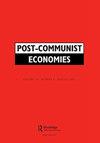综合可持续性视角下的社会经济发展——中国社会资本、收入水平和收入不平等的互动分析
IF 2.2
3区 经济学
Q2 ECONOMICS
引用次数: 0
摘要
摘要本研究旨在探讨中国可持续发展的社会和经济支柱的双边互动,以揭示它们是协同作用还是权衡作用。为此,本研究采用面板数据的bootstrap方法和普通分位数回归模型,估计了不同分位数的中国家庭中,包括政治身份、家庭关系网络和信任在内的社会资本代理对经济状况代理、家庭收入的影响。本研究使用了北京大学中国社会科学研究中心于2014年、2016年和2018年进行的中国家庭跟踪调查(CFPS)的微观调查数据。结果表明,社会资本对经济地位有正向影响,这意味着社会发展对可持续发展的经济支柱产生协同影响。此外,进一步的研究表明,经济状况的改善在中国家庭的不同分位数之间平均分布。这一结果表明,经济发展对社会支柱的反映作用是协同的。总的来说,这些发现接受了可持续性的社会和经济支柱之间的协同互动,这与综合可持续性观点一致。这些发现表明,社会和经济部门的决策者都应该考虑自己的计划和战略对其他部门的影响。本文章由计算机程序翻译,如有差异,请以英文原文为准。
Social and economic development from an integrated sustainability perspective: analysing the interaction of social capital, income level, and income inequality in China
ABSTRACT This study aims to explore bilateral interactions of social and economic pillars of sustainability in China to reveal if they are synergistic or trade-off. To this end, this research uses the bootstrap method for panel data and an Ordinary Quantile Regression model to estimate the effects of social capital proxies including political identity, family relationship network and trust on economic condition proxy, household income, in different quantiles of Chinese households. This study uses data based on microsurvey data from the China Family Tracking Survey (CFPS) conducted by the China Social Science Research Center of Peking University in 2014, 2016 and 2018. The results show that social capital positively affects economic status implying the synergistic impact of social development on economic pillars of sustainable development. Moreover, further examination reveals that the resulted improvement in economic status is distributed equally among different quantiles of Chinese households. This result implies that the reflective effect of economic development on social pillar is synergistic. Overall, these findings accept the synergistic interactions between social and economic pillars of sustainability which is consistent with the integrated sustainability perspective. These findings suggest that policymakers in both the social and economic sectors to consider the consequences of their own plans and strategies for the other sectors.
求助全文
通过发布文献求助,成功后即可免费获取论文全文。
去求助
来源期刊

Post-Communist Economies
ECONOMICS-
CiteScore
4.90
自引率
18.20%
发文量
21
期刊介绍:
Post-Communist Economies publishes key research and policy articles in the analysis of post-communist economies. The basic transformation in the past two decades through stabilisation, liberalisation and privatisation has been completed in virtually all of the former communist countries, but despite the dramatic changes that have taken place, the post-communist economies still form a clearly identifiable group, distinguished by the impact of the years of communist rule. Post-communist economies still present distinctive problems that make them a particular focus of research.
 求助内容:
求助内容: 应助结果提醒方式:
应助结果提醒方式:


